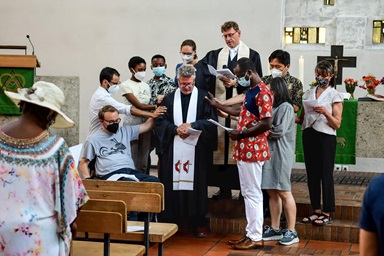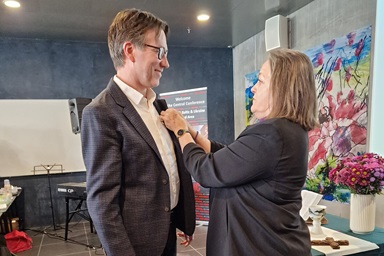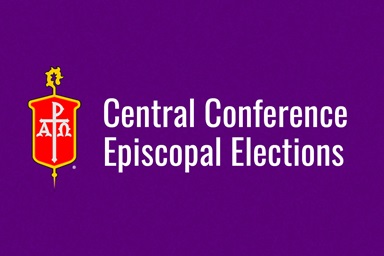In an episcopal area where United Methodists are scattered over at least 11 time zones, connecting in faith to overcome isolation was important even before the coronavirus pandemic.
These days, says Eurasia Area Bishop Eduard Khegay, that means tapping into technology in a way that has united his vast geographical area as never before.
“I am amazed and very grateful to the people called Methodists in Eurasia,” wrote Khegay, who is based in Moscow, in an article on the Eurasia website. “In this time of self-isolation, we have proven to be people of faith, not people of the buildings.”
The online Easter worship organized by the Eurasia Area provided a unique moment of connection, Khegay reported. Clergy and laity “participated together as a connectional church from Vladivostok to Kaliningrad, from Bishkek to St. Peterburg, from Satka to Kiev, from Uzhgorod to Almaty and many other places in Eurasia,” he said.
Quite simply, it is a time of virtual travel. “Many pastors can be invited to preach online in the church in another city or country. I can visit many churches online in my area and experience the connectional aspect of our church,” Khegay said.
“And even though online presence cannot replace physical presence, it is a wonderful opportunity that we as people of faith can use in such a time like this.”
The United Methodist Church has four episcopal areas in Europe — Eurasia, Nordic and Baltic, Germany, and Central and Southern Europe — spanning a wide variety of countries and cultures. That could mean different experiences and timetables as European nations gradually ease the lockdown restrictions put in place to slow the spread of COVID-19.
The World Health Organization/Europe says the transition will be complex and uncertain. “Challenges and circumstances vary from country to country and there is no one-size-fits-all approach,” the agency stated in an April 24 press release. “It is vital that countries clearly communicate this to the public to build trust and ensure that people observe restrictions specific to their situation.”
As of April 28, Europe had counted 1.38 million COVID-19 cases, the WHO reported, with 126,461 confirmed deaths. Spain, Italy, France and Germany are the European countries with the highest individual totals of confirmed cases.
While technology has helped keep United Methodists connected in Eurasia during this crisis, it doesn’t reach everyone. The bishop acknowledged that the elderly remain the most vulnerable and the most disconnected part of the population.
In an April 23 press statement, Dr. Hans Henri P. Kluge, WHO regional director for Europe, noted that estimates show that up to half of those who have died from COVID-19 in the European region were residents in long-term care facilities. “This is an unimaginable human tragedy,” he said.
Reaching beyond the congregation in Norway
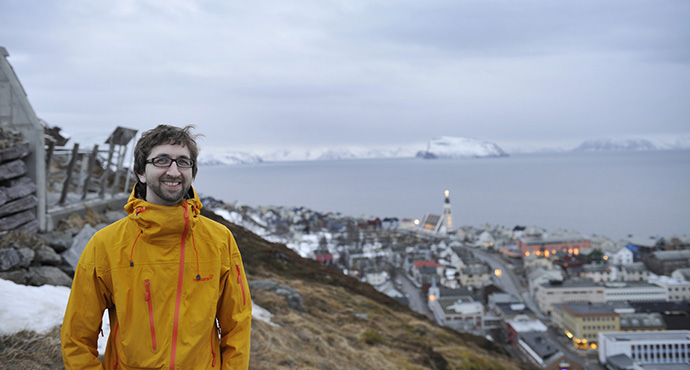
When the “stay home” order was issued March 12 in Norway, United Methodist churches had to lock their doors, suspend almost all normal activity and send their staff home.
This response to the COVID-19 crisis led to an impressive outburst of creativity and activity in both new and old ways. Some of those actions might even have a lasting impact on how United Methodists in Norway serve as a church, beyond the coronavirus crisis.
The Rev. Knut Refsdal, a district superintendent, said he is proud of the church’s response to the crisis. “We have made a difference in the lives of people and communities and it has been touching to see how so many in this situation have brought out the best in themselves,” he added.
The first major decision the church made was that no ordained person would be laid off temporarily, as was happening with many other Norwegians. This gave everyone the possibility to assess the situation and try to find ways to attend to their flock in a time without physical contact.
Most United Methodists in Norway are active on Facebook, so that social media platform and videos were used initially to console, guide and give hope.
After a week of trial and error, a more consistent media strategy was adopted. Every day a daily devotion by a pastor or deacon is presented on the Norway Conference’s main channel, as well as on YouTube and Facebook. Often, a daily worship service for the entire annual conference is available online, hosted by local churches and those services are getting thousands of views. In addition, some of the larger churches have held their own services and devotions.
Being forced to learn how to use social media to hold worship services, share devotionals and organize meetings has moved Norwegian United Methodists “five years into the future in just a few weeks,” Refsdal said.
Pastors and deacons also have told him that their cell phones have become their most important ministry tool, with some even calling every person — active or not — on the congregational membership rolls. “The responses have only been positive,” he reported.
Voice contact over the phone has been especially important to elderly members of the world’s most northern United Methodist church in Hammerfest, Norway.
During an online seminar about being church in a time of isolation, the Hammerfest pastor stressed the importance of keeping in contact with everyone. “There are some that are left behind when we go online,” the Rev. Per Bradley said. “The old phone is important to reach them.”
But Bradley is very enthusiastic about online worship and about using Zoom to be more local and personal — offering morning prayers and creating small-group meetings and other gatherings that have attracted some new people.
“We see that a lot of this is functioning well, especially the small groups on Zoom. I believe that we will continue with some meetings on Zoom in addition to the physical ones when we return to normal,” Bradley said.
Refsdal also is noticing more involvement on the community level. Congregations are contacting local authorities and other local stakeholders to offer help, cooperation and support as communities deal with the pandemic, he explained.
“I believe that the UMC in Norway has been in contact with more people outside the congregations than we have been for many years,” Refsdal said.
Germany: The cross at the door

In Munich, United Methodists continued an Easter tradition this year imported from British Methodists: making a passion cross from the dried trunk of the Christmas tree.
One cross was placed at the door of the United Methodist Church of Peace on Munich's Frauenlobstrasse, even though the church itself was closed because of the virus.
Passersby were invited to put flowers of hope, confidence and thanks on the cross for Easter, using it as a sign of solidarity with people in the district during a time of crisis. The church members also put together a one-hour Easter service described as an "acoustic colorful flower cross."
On Good Friday, Germany Area Bishop Harald Rückert held a service that was broadcast via YouTube, acknowledging the real and pressing fear over COVID-19 and its disruptions while citing the confidence that Jesus brings. The video now has 9,699 hits. With 30,000 United Methodists in Germany, the number of viewers went far beyond expectations.
Since then, many states in Germany are introducing steps to lift restrictions as the coronavirus infection rate slows, including allowing the reopening of smaller stores, letting high school students take exams and restarting production lines in some factories. Social distancing guidelines remain in place through May 3.
United Methodists are taking a measured approach to the fact that some German leaders soon will allow services in church buildings, an option already open on a very limited basis in two states. Rückert discussed the easing of restrictions during an April 23 video conference with the German church’s nine district superintendents. The church leaders see the need for “a common step-by-step plan for services and other events."
The further waiving of services could also be an option for some congregations. In this sense, says Rückert, religious freedom can also mean "that we do not have to do everything the state allows us in terms of freedom."
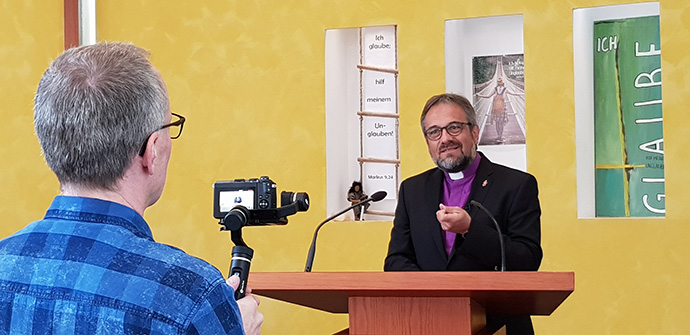
In addition to these first steps, United Methodist churches in Germany are now being given the opportunity to open the previously closed church buildings "for personal reflection and prayer," with the approval of the responsible superintendent and in compliance with specific conditions.
More than just waiting for better days to come

Michal Tagaj, 82, is a member of the United Methodist Church in Sered, Slovakia, and has made more than 80 masks with his sewing machine. His granddaughter Emma shows off some of the masks, which are being distributed to church members and people in high-risk groups in several different towns. Photo courtesy of the Central Conference of Central and Southern Europe.
The government banned public worship services in Slovakia weeks ago, but that did not cease the activity of United Methodists.
In addition to holding online worship and distributing printed sermons and other materials to those without access to the internet, church members are finding ways to do ministry even in isolation.
Michal Tagaj, an 82-year-old member of the United Methodist Church in Sered, has created more than 80 face masks with his sewing machine. As in other places, wearing masks in public is mandatory in Slovakia.
His masks have been distributed to community members and to clients of Teen Challenge, a rehabilitation center for drug-addicted people in Sered; to a hospital and to the homeless in Bratislav; and to United Methodist congregations in Bratislava, Trnava, Sered and Gerlachov.
Slovakia is part of the Central Conference of Central and Southern Europe, which is facing numerous challenges due to the pandemic. At the same time, the church is faithfully trying to take action.
In the last week of April 2020, there were signs of hope that the peak of the crisis might have passed in Europe — or at least in parts of it. As the number of new infections is decreasing, several countries have announced some cautious steps toward normality — whatever “normal” might mean in the future. It seems, however, that the situation for the churches and their ministries will not change as quickly.
In Switzerland, for example, there are three Methodist-related hotels. Since a considerable number of guests come from abroad, the number of reservations is not expected to dramatically increase over the course of the coming weeks, which causes a considerable financial challenge. For the Hotel Artos in Interlaken, which is connected to a home for elderly people, the current situation is kind of a tightrope walk: While hotel guests are needed from an economic point of view, it has to be strictly avoided in case these guests do harm by bringing in the virus.
In Zurich, a United Methodist congregation has been working for decades with people on the margins of society. Together with other churches and institutions, the congregation has organized a “Take-Away,” where more than 150 meals per day are provided to the marginalized of this part of the city.
In Austria, churches may consider resuming their worship services in mid-May, but with heavy social distancing restrictions, including requirements related to security staff and face masks. Given these restrictions, the church leadership decided not to re-open the churches in May but to continue providing liturgies and materials for worship services at home on a weekly base. Additionally, a weekly online worship service for all United Methodist congregations in Austria is offered.
The United Methodist Church in Bulgaria is reaching out electronically in many ways. A YouTube channel offers 40 playlists and more than 640 videos of sermons, Bible studies, morning prayers, worship services and lectures. Holy Week, celebrated one week later than in the West, featured daily joint worship services hosted by a particular local church. Online Holy Communion was offered across the Central and Southern Europe conference as part of Holy Week worship.
Despite the Bulgarian church’s financial challenges, the church provided a month of free rent to the longtime tenants who have difficulties conducting business right now. Prison ministry, one of the denomination’s important diaconal ministries, is currently limited, but Superintendent Daniel Topalski said he expects that this work will soon be fully resumed.
The church’s regional response to the coronavirus crisis does not change the fact that there are huge problems for particular groups of the population. Many elderly people, for instance, are in dire need because their children and grandchildren have migrated to other countries and they have to struggle for survival, hardly receiving any support from the public authorities.
The Roma people often live on the margins of society under poor conditions. With large families sharing one or a few rooms, the Roma are particularly endangered. Instead of receiving assistance, they often experience discrimination or even blunt racism and hatred.
Many Roma have lost income since they are neither allowed to collect plastic bottles or scrap metals nor to do street trading of groceries, household items or flowers.
The children are particularly affected by the closed schools as they cannot follow online education because of lacking technical equipment. The United Methodist Church in several countries tries to help, particularly by bringing food to Roma who are not allowed to leave villages where there is no food for sale.
This story was compiled by Linda Bloom, UM News assistant news editor, with contributions from Karl Anders Ellingsen, a communicator and editor for the United Methodist Church in Norway; Klaus Ulrich Ruof, public relations officer and press spokesman for the United Methodist Church in Germany in Frankfurt am Main; and Urs Schweizer, assistant to Bishop Patrick Streiff in the Central Conference of Central and Southern Europe.
News media contact: Linda Bloom, assistant news editor, [email protected] or 615-742-5469. To read more United Methodist news, subscribe to the free Daily or Weekly Digests.Like what you're reading? Support the ministry of UM News! Your support ensures the latest denominational news, dynamic stories and informative articles will continue to connect our global community. Make a tax-deductible donation at ResourceUMC.org/GiveUMCom.


